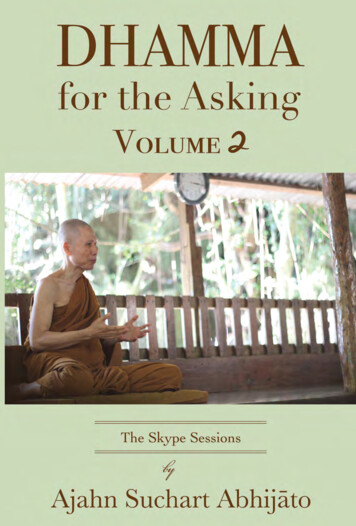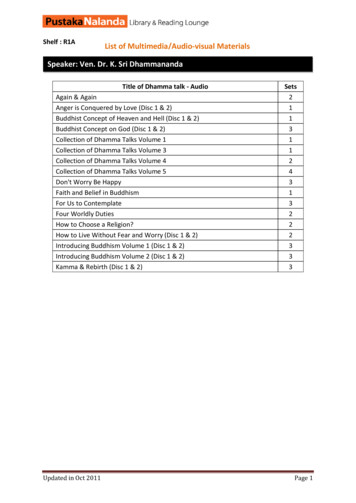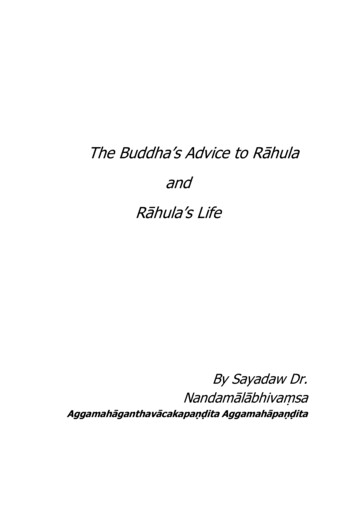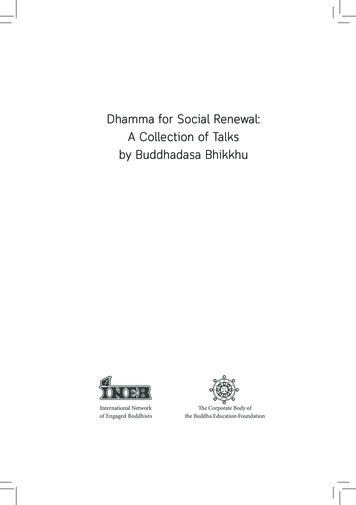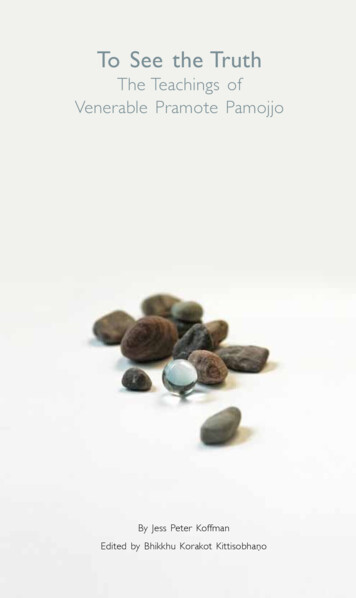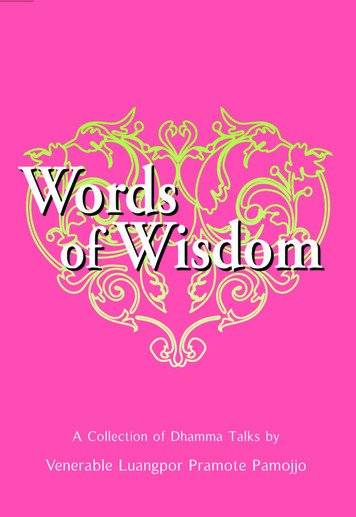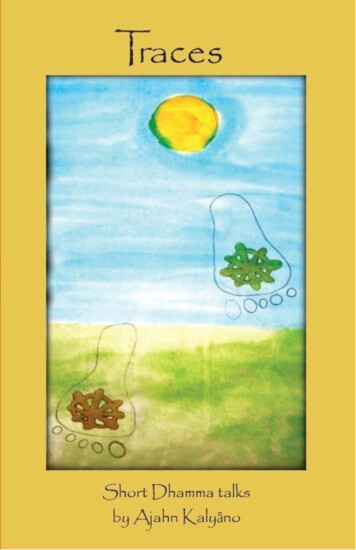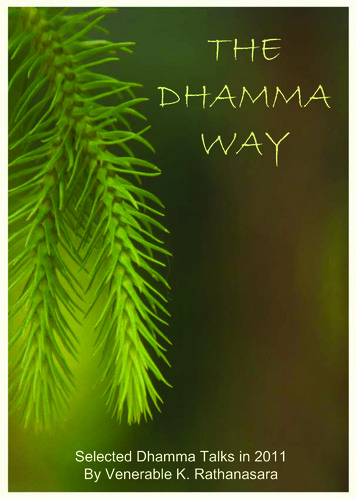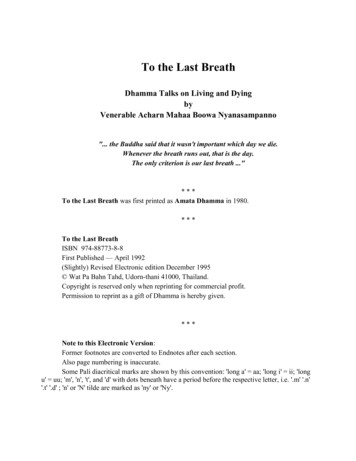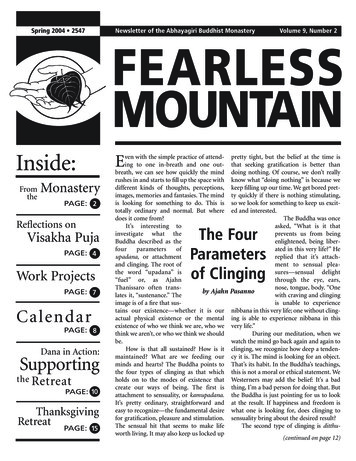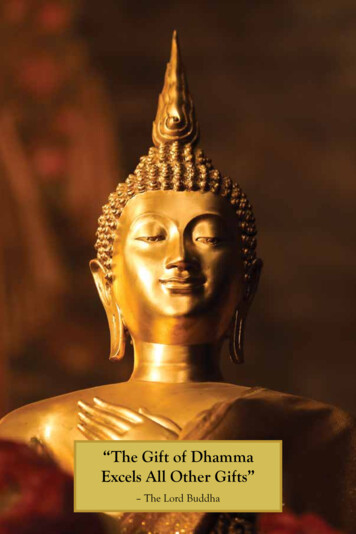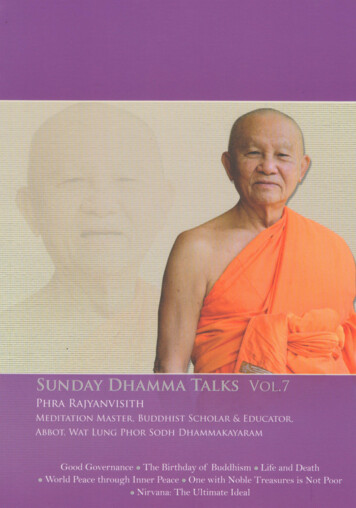
Transcription
1Sunday Dhamma TalksVolume 7byVenerable Phra RajyanvisithPresident, National Coordination Center of ProvincialMeditation Institutes of ThailandAbbot, Wat Luang Phor Sodh DhammakàyàràmInterviews onThe National Broadcasting System of ThailandJuly - December 2010
2Published byWat Luang Phor Sodh DhammakàyàràmDamnoen Saduak District, Rajburi Province 70130, ThailandRecognized Excellence Rajburi: Provincial Meditation Institute & Provincial PaliStudies Center; Sangha Ecclesiastical Region 15 Academic ServicesUnit for Mahachulalongkornrajavidyalaya University(Covering four central provinces) National Coordination Center of Provincial MeditationInstitutes of Thailand Wat Luang Phor Sodh Buddhist Meditation Institute,Associated Institution of the World Buddhist University Center for Development of Virtues and Ethics for theSecurity of the Nation, Religion and Monarchy1st Edition February 2011ISBN:Copyright 2012 byWat Luang Phor Sodh DhammakàyàràmAll Rights Reserved.No part of this publication may be reproducedor transmitted in any form withoutthe prior permission of the publisher.
3We dedicate this book and any merit it may generate, alongwith all our efforts at Wat Luang Phor Sodh – The beautifulcampus, the Abbot’s teachings, Phra Mahà Cetiya Somdej,the International Retreats, the Thai Retreats, and the 24hour Meditation Vihàra – to our belovedVenerable Phra Mongkol-ThepmuniLuang Phor Sodh Candasaro
4AcknowledgementsI am deeply indebted to the National BroadcastingSystem of Thailand for making these Sunday DhammaTalks possible. May their valiant efforts continue to prosper with the efficacy of the merit accumulated from thisDhamma propagation.I would also like to take this opportunity to thankPhra Khru Baitika Dr. Barton Yanathiro for serving asinterviewer during these broadcasts and as the editor ofthis volume. May he also share in reaping the benefits ofany merit generated.Finally, let me also express my deep gratitude toPhra Mahà Prasert Paññàseññho and Phra NatpakananGuõaïkaro of the Wat Luang Phor Sodh Publication’sOffice, to Phra Mahà Somchat and the Wat Luang PhorSodh Audio-Visual Staff, to Phra Watcharapol Thirajittofor photography, and to my faithful Secretary Phra MahàChainipoj for their indispensable support in making thisendeavor successful.Phra RajyanvisithAbbot, Wat Luang Phor Sodh DhammakàyàràmPresident, National Coordination Center of ProvincialMeditation Institutes of Thailand
5CONTENTSChapterPage1. Introduction. 12 Dhamma Principles for Good GovernanceJuly 4, 2010. 73 Āsālha Pūjā: The Birthday of BuddhismAugust1, 2010. 164 Life and DeathSeptember 5, 2010. 265 World Peace through Inner PeaceOctober 3, 2010. 366 One with Noble Treasures is Not PoorNovember 7, 2010. 467 Nirvana: The Ultimate IdealDecember 5, 2010. 558 Summary and Conclusion. 73The Author: Phra Rajyanvisith. 78Wat Luang Phor Sodh Dhammakayaram. 81International Meditation retreat. 84
INTRODUCTION1Chapter 1“Happy Day!” Welcome to Sunday Dhamma TalksVolume 7. I am the editor, Phra Khru Baitika Dr. BartonYanathiro, from the United States. In 2007 the NationalBroadcasting System of Thailand invited Venerable PhraRajyanvisith to initiate a series of Sunday Dhamma Talksin English on the first Sunday of each month. I served asinterviewer during the broadcasts.Venerable Phra Rajyanvisith is one of Thailand’smost eminent meditation masters, Buddhist scholars, andeducators, with an extremely impressive record well recognized from local through international levels. He is theNational Coordinator of the Provincial Meditation Institutes of Thailand; Director of the Center for Developmentof Virtues and Ethics for the Security of the Nation, Religion and Monarchy; and the beloved Abbot of Wat LuangPhor Sodh Dhammakayaram. In 2010 Phra Rajyanvisithreceived the gold award from the Parliamentary Committeeon Religion, Arts & Culture for outstanding contributionto the dissemination of Buddhism.CHAPTER 1INTRODUCTION
2SUNDAY DHAMMA TALKS VOL 7Sunday Dhamma TalksCHAPTER 1This is Volume 7 in the continuing series of SundayDhamma Talks. Volume 1 began with an overview of LordBuddha’s teachings and continued through the first of theThree Trainings (Tisikkhā) which is Morality (Sīla). Volume 2 completed the Higher Trainings with Concentration(Samatha) and Insight Meditation (Vipassanā) and thenfocused on Lord Buddha’s instructions for meditation aspresented in the “Greater Discourse on the Four Foundations of Mindfulness” (Mahāsatipatthāna Sutta). Volume3 expanded on basics – morality or “Do Good!” – selflessgenerosity, loving kindness and compassion, expressedthrough Right Thought, Intentions, Speech, Action, andLivelihood. Volumes 4 and 5 discussed Lord Buddha’spopular discourse on Life’s Highest Blessings. Volume6 began by stressing that social harmony brings peacefulhappiness, in response to the Red Shirt vs. Yellow Shirtviolence in Bangkok. From there, the volume continuedto teach fostering peaceful happiness and progress, buton a more personal level, until the final chapter returnedto national problems and concluded with a recommendation for formalizing a constitutional monarchy based onsovereignty residing in the citizens
INTRODUCTION3Volume SevenThe rest of this volume is devoted to reflecting onthe crucial, overwhelming questions that we all must answer, but too often avoid. What is life? What is its purpose?How should I live? These questions are daunting, but if wegive up asking them we risk wasting our whole life.Chapter 4 is entitled simply “Life and Death.”It lays out the nature of life, its purpose and the way toattain maximum ultimate meaning and peaceful happiness,based on Lord Buddha’s last words. Chapter 5 considers “World Peace through Inner Peace,” based on: LordBuddha’s well-known Ovāta-pātimokkha: “Avoid evil. Dogood. And, purify your mind.” The teaching links humanity’s highest hopes for world peace to one’s own personalinner peace.Chapter 6 lifts one’s vision from the immediateworldly level to supra-mundane considerations. It teachesCHAPTER 1This Volume 7 covers the series of broadcasts fromJuly through December of 2010. It begins by continuingthe “good governance” counsel based on Dhamma andthen contains a special presentation for Asalha Puja, theBirthday of Buddhism, revering and appreciating LordBuddha’s first sermon that resulted in Elder Ko daññaattaining the dustless, stainless Dhamma Eye.
4SUNDAY DHAMMA TALKS VOL 7that only transcendent, “Noble” Treasures like Faith,Morality, Generosity and Wisdom can be taken along afterdeath.Chapter 7 completes these supra-mundane reflections with contemplation of the unconditioned NirvanaElement (Nibbāna-dhātu) as the ultimate ideal whichexhibits “Self” characteristics.CHAPTER 1Thus, overall, this volume represents an extremelyimportant collection of contemplations about the mostimportant questions in life that we all too often put asideas unanswerable.Venerable Phra RajyanvisithNow, I would like to introduce Venerable PhraRajyanvisith for those who are not yet familiar with him.He is the Abbot of Wat Luang Phor Sodh Dhammakayaramin Damnoen Saduak District of Rajburi Province, Thailand.His mission is to stimulate Buddhism, placing equal emphasis on academic study and meditation practice.Phra Rajyanvisith has been broadcasting, lecturingand publishing about Buddhism since 1970 and toureduniversities in the United States for four years, before thepress of responsibilities at home became too demanding.In 1986, he ordained as a monk with the name Sermchai
INTRODUCTION5Phra Rajyanvisith has been the Abbot of WatLuang Phor Sodh Dhammakayaram, which he foundedand built, since 1991 and has led the temple to become arecognized center of excellence in meditation practice, Palilanguage, scripture studies, and Buddhist management.The temple conducts or coordinates training locally forRajburi Province, regionally for Mahachulalongkornrajavidyalaya University and Ecclesiastical Region 15 (fourcentral provinces), nationally for the Thai National Officeof Buddhism, and internationally for the World BuddhistUniversity.Phra Rajyanvisith has published over 70 books,400 articles, and two journals, and recorded over 1,000Dhamma lectures. In 2007 he was awarded an honorarydoctorate in Buddhist Principles of Management fromMahachulalongkornrajavidyalai University and in 2009he received a second honorary doctorate in Buddhist Studies from Mahamagut University. In 2008 he was electedNational Coordinator of the Provincial Meditation Institutes of Thailand and in 2009 he was appointed Director ofthe Center for Development of Virtues and Ethics for theSecurity of the Nation, Religion and Monarchy. In 2010Phra Rajyanvisith received the gold award from the Par-CHAPTER 1Jayamanggalo. In 1998 he received the Royal EcclesiasticalRank of Phra Bhavana Visutthikhun; and in 2004 he wasawarded the rank of Phra Rajyanvisith.
6SUNDAY DHAMMA TALKS VOL 7liamentary Committee on Religion, Arts & Culture foroutstanding contribution to the dissemination ofBuddhism.In sum, Phra Rajyanvisith has an extremelyimpressive record which has been widely recognized. Youwill find that the broadcasts compiled here go far beyondthe ordinary in both scholastic erudition and inspirationfor meditation practice. This is an exceptional union ofacademic and transcendental knowledge, rarely availablein English. Please take full advantage of it.CHAPTER 1Phra Khru Baitika Dr. Barton Yanathiro,Interviewer and Editor.
DHAMMA PRINCIPLES FOR GOOD GOVERNANCE7Chapter 2Dhamma Principlesfor Good GovernanceQuestion 1: Good morning, Venerable Phra Rajyanvisith. Today is our 37th consecutive program and weeagerly await your profound insights. First, however, couldyou please review our previous broadcast.Answer 1: Good morning ladies and gentlemen.Last time we discussed the importance of gratitude andour obligation to appreciate the bountiful nurturing ofour motherland. Buddhism has pertinent advice to offerregarding our current political crisis. We have to attackthe underlying problem back to the root cause. LordBuddha advises avoiding fools, implying electingvirtuous Members of Parliament not driven by greed,hatred or delusion.Lord Buddha also advises “Honor the worthy” implying the King. We should honor the King by formalizingCHAPTER 204 July 2010
8SUNDAY DHAMMA TALKS VOL 7a legitimate constitutional monarchy in a valid constitutionwith sovereignty stemming directly from consensus of thecitizens, where Thai citizens collectively praise the Kingto serve as Head of State, employing the sovereign powerto govern. The king then governs through three channels:Administration through the cabinet and ministries, legislation through Parliament, and administering justice throughthe courts.CHAPTER 2We concluded that these powers should be formalized into two documents: (1) Lak-niti-raj or the LawGoverning the State and (2) Lak-niti-dhamma or the HigherDhamma Law which would govern making changes inthe constitution, ensuring impartial administration, andguaranteeing fair application of justice.Question 2: Thank you very much, Phra Rajyanvisith. Now, what will we discuss today?Answer 2: Today we shall build on our lastdiscussion by examining the principles for good governance advocated in Buddhist teachings. As monks, we feeldeep compassion for our countrymen currently embroiledin seemingly endless political conflicts which are destroying the material, political, economic and social fabric of ourcountry. Thai citizens are about 80% Buddhist. Traditionally, the Thai constitution reflected this and was based onthe Buddhist principles of good governance propounded
DHAMMA PRINCIPLES FOR GOOD GOVERNANCE9by the Great King Ashoka who set the foremost historicalexample of good governance still respected worldwidetoday.Psychologically, our national conflicts stem fromthe three root causes of defilements – greed, hatred anddelusion. Sociologically, they pit Bangkok elites, whohave traditionally dominated Thai politics against themajority of Thai citizens who live in the countryside. Weare experiencing a watershed moment in Thai history.Citizens countrywide have awakened to their democraticrights and are appealing for constitutional participation ingovernment.Democratic Constitutional Monarchy is most suitablefor Thailand because each human is best able to control hisor her own fate and all have equal right to elect their representatives. Such a system is most efficient. The democraticsystem of voting has the least defects and most potentialadvantages. In addition. Democratic Constitutional Monarchy preserves royal rule which has been highly respectedby Thai people for a long time.CHAPTER 2We monks would like to advise the Buddhist way tosolve these national problems through governance based onDhamma principles. We will consider three fundamentalBuddhist principles: (1) Correspondence with UltimateTruth (Dhamma), (2) Moral behavior (Sīla), and (3) Effective governmental administration
10SUNDAY DHAMMA TALKS VOL 7CHAPTER 2Throngs of Thai citizens have gathered in Bangkokto appeal for their democratic rights. They recognize thedegradation of the Thai governmental system and its elitebiases institutionalized in the latest constitution. To beeffective and sustainable, any governmental system mustconform to the ultimate realities of nature (Dhamma) inwhich the ultimate source of sovereignty lies in the heartsof the citizens. Thai citizens have had a long history ofroyal benevolence and are ready to entrust their welfare tosuch aristocratic nobility. But, their brief encounter withelected leaders has been difficult, filled with greed. Thus,Democratic Constitutional Monarchy is most acceptablein Thailand.We suggest that the directions for good governance be codified in two documents. The Lak-niti-raj orConstitution would be drafted through a democraticprocess involving representatives of all Thai citizens electedby a majority of the public in each area, not appointedby small clique groups or elites. The Lak-niti-dhamma,would define higher meta-laws to guarantee human rights,civil liberties and moral behavior in line with Buddhistprecepts. For example, procedures for making changesin the constitution would be spelled out, along withprocedures to guarantee fair elections. Other essential areasrequiring such Lak-niti-dhamma direction include systemsfor guaranteeing fair law enforcement, just court decisions,financial transparency and parliamentary oversight. The
DHAMMA PRINCIPLES FOR GOOD GOVERNANCE11Lak-niti-dhamma would ensure virtuous behavior promotingpeaceful happiness in line with the ultimate Truths, forestall anticipated cheating and guide long-term nationaldevelopment upwards. Good governance must aim atsatisfying the people’s needs, promoting fair contentmentand peaceful happiness, and fostering virtuous behavior(Sīla and Dhamma). It must be conducted by governmentleaders endowed with Brahma-vihāra mentality.Answer 3: The second Buddhist principle is thatgood government leaders must exhibit moral behavior(Sīla). Well-intentioned leaders practicing Right Action,Right Speech and Right Intentions or Thought are crucial for national peace and prosperity. They will producecorrect laws and behave correctly in accordance withthese Laws. The Thai people respect monarchy becausehistorically kings have fostered peacefully happy living inThailand – up to and including the current king. Second,Thai kings have always ruled in accordance with the tenRoyal Precepts that prescribe mutual obligations for kingsand citizens. In brief, these ten Royal Precepts are:A King should: (1) Be generous, practicing Dāna,(2) Observe moral precepts (Sīla), (3) Be ready to makesacrifices for his people (Pariccāga), (4) Demonstrate in-CHAPTER 2Question 3: Thank you very much, Venerable PhraRajyanvisith. What is the second Buddhist principle?
12SUNDAY DHAMMA TALKS VOL 7tegrity (Ājjava) by being straightforward in dealings, (5)Be gentle and kind (Maddava), (6) Control sensual desires& demonstrate non-indulgent austerity (Tapa), (7) Be freefrom anger and resentment (Akkodha), (8) Be compassionate and non-violent towards all (Avihi sā), (9) Be tolerant(Khanti), and (10) Be approachable, but undeviating fromRighteousness (Avirodhana).CHAPTER 2These ten rules have been observed by all Thai kingsup to the present. That is why the Thai people have so muchrespect for royalty. The king is our highest refuge. Kingsperform their role with supra-mundane Brahma-vihāramentality – loving kindness, compassion, sympathetic joyand equanimity. Kings have historically removed seriousproblems, kept the country free, and brought peace to thenation.For good governance, Thai government leaders must be well-intentioned and should have the seven“Sappurisa-dhamma” Virtues of a noble individual: (1)Knowing the law showing the cause (Dhammaññutā), (2)Knowing the meaning, the purpose and the consequences(Atthaññutā), (3) Knowing himself (Attaññutā), (4) Knowing moderation – how to be temperate (Mattaññutā), (5)Knowing proper timing – how to choose and keep time(Kālaññutā), (6) Knowing the assembly and knowingsociety (Parisaññutā), (7) Knowing the individual andknowing various individuals (Puggalaññutā).
DHAMMA PRINCIPLES FOR GOOD GOVERNANCE13Question 4: Thank you very much, Venerable PhraRajyanvisith. Now, what is the third Buddhist principle forgood governance?Answer 4: The third principle for good governanceis effective administrative systems based on Buddhist wisdom (Paññā) and purity (Pārisuddhi). Wise administrativedevelopment must recognize that a government leader’sproper duty is to serve the majority of Thai citizens countrywide, not just a small clique of elites. This realizationradically alters the services needed, magnitude of cost andlogistics of service delivery. Rural health care, for example,becomes highly desirable, but expensive and difficult toprovide.Such considerations rapidly suggest causal analysisof the problems requiring government aid and increasedemphasis on educational programs to prevent the problemsfrom arising rather than just post-crisis aid to victims. Bud-CHAPTER 2Government Leaders must recognize that theirproper duty and responsibility is to serve the needs of thepeople – most specifically the majority of the people –while behaving always virtuously with generosity, personalsacrifice and merit-making (Dāna), including giving Rightadvice and teaching dhamma. Ultimately, the highest Dānais giving forgiveness. Good governance must be carriedout with Brahma-vihāra mentality.
14SUNDAY DHAMMA TALKS VOL 7dhism also suggests wide-ranging educational programs todevelop the skills of rural Thais to provide lacking servicesfor their neighbors. Government sponsored Pharmacistand First Aid Courses, for example, could help alleviatethe lack of such services in rural areas while substantiallyimproving the livelihood of these graduates. From anotherperspective, village wats represent trustworthy social centers in village communities which can serve as hubs fordispensing government services or conducting governmentactivities. Many now run schools or serve as voting centersduring elections.CHAPTER 2Buddhist purity provides a framework for justiceand transparency considerations. The concept of Agati orprejudice details four types of wrong behavior as follows:(1) Chandāgati is prejudice caused by love or desire. (2)Dosāgati is prejudice caused by hatred or enmity. (3)Mohāgati is prejudice caused by delusion or stupidity. And,(4) Bhayāgati is prejudice caused by fear.The most obvious targets for improvement in Thailand’s current democratic environment are the restrictionson the freedom of the press, radio and television and corresponding lack of reliable, independent information ongovernment activities or political candidates. Concernedvoter citizens have very little reliable information on whichto base their important election decisions.
DHAMMA PRINCIPLES FOR GOOD GOVERNANCE15In conclusion, if the government develops in accordance with these principles, our country will develop asa pure, perfect, democratic constitutional monarchy withthe needs of the majority satisfied.Question 5: Thank you very much, Phra Rajyanvisith for this very thoughtful presentation. Now, could youplease lead us in a few moments of meditation.[Please see meditation practice on Chapter 7 pageCHAPTER 267.]
16SUNDAY DHAMMA TALKS VOL 7Chapter 3Asalaha Puja:the birthday of Buddhism01 August 2010CHAPTER 3Question 1: Good morning, Venerable Phra Rajyanvisith. This will be our 38th consecutive program. Weeagerly await further stimulating insights. But first, couldyou please review our previous broadcast.Answer 1: Good morning ladies and gentlemen.Last time we discussed principles for good governancebased on Buddhist teachings. We monks feel deep compassion for our countrymen embroiled in seemingly endlesspolitical conflicts. Thai citizens are mainly Buddhist, andtraditionally, the constitution reflected principles of goodgovernance made famous worldwide by the Great BuddhistKing Ashoka. Psychologically, our national conflicts stemfrom the three root causes – greed, hatred and delusion.Sociologically, they pit Bangkok elites against the Thaimajority who live in the countryside. We are experiencing
ASALAHA PUJA: THE BIRTHDAY OF BUDDHISM17We proposed principles corresponding with Ultimate Truth (Dhamma), morality (Sīla), and effectiveadministration. Ultimate sovereignty lies in the heartsof Thai citizens. Democratic Constitutional Monarchy ismost suitable because voters are best able to control theirown fate. They have equal right to elect representativesand democratic voting has the least defects. In addition,Constitutional Monarchy preserves royal rule which hasbeen highly respected by Thai people for a long time.We suggested that the directions for good governance becodified in two documents. The Lak-niti-raj or Constitution would be drafted democratically by representativeselected from each area, not appointed by small cliques ofelites. The Lak-niti-dhamma would define higher metalaws to guarantee human rights, civil liberties and moralbehavior, such as procedures for changing the constitution,guaranteeing fair elections, just court decisions, financialtransparency and parliamentary oversight. This wouldensure virtuous behavior, promote peaceful happiness,forestall anticipated cheating and guide long-term nationaldevelopment upwards.CHAPTER 3a watershed moment in Thai history. Citizens countrywidehave awakened to their democratic rights and are appealingfor constitutional participation in government.
18SUNDAY DHAMMA TALKS VOL 7Question 2: Thank you very much, Venerable PhraRajyanvisith. Now, what are we going to discuss today?CHAPTER 3Answer 2: This week we celebrated the Birthday ofBuddhism. Āsālha Pūjā is the day on which Lord Buddhapresented his first sermon 2,598 years ago. This first sermonis called the Discourse Turning the Wheel of Dhamma orthe Dhamma-cakka-pavatana-sutta. Today we shall reverethis noble event with our humble appreciation of its profound penetration and enduring significance. Āsālha Pūjācommemorates three key inaugural events: Presentationof the First Sermon, Ordination of the first Bhikkhu, andcompletion of the threefold Triple Gem by adding theSangha to the Buddha and the Dhamma. This constitutesthe official birth of Buddhism as a religion:Imassmiñca pana veyyākara assami bhaññamāne āyassamato ko daññassaviraja vītamala dhammacakkhu udapādi yaïkiñci samudayadhamma sabbanta nirodhadhammantīti.During Lord Buddha’s sermon, the dustless, stainless Dhamma Eye arose in ElderKo dañña that everything that has thenature of being born innately contains thenature of passing away.
ASALAHA PUJA: THE BIRTHDAY OF BUDDHISM19The Five Vakkiya were initially hesitant to receiveLord Buddha, but he convinced them to listen by saying“Have I ever before claimed to be enlightened?” In theformal Dhammacak-kappa-vatana sermon, Lord Buddhadeclares His enlightenment and how it arose, beginningwith the two extreme practices to be avoided by Truthseekers, then declaring the triumphant Middle Path and itsfruits, including the Four Noble Truths and Nirvana.Question 3: Thank you very much, Venerable Sir.What are the two extremes to be avoided?Answer 3: The first extreme to avoid is self-indulgent wallowing in sensuality and sexual indulgence. Thisis the common pattern of householders. It is vulgar andworldly and is the cause for the construction of defensiveego-boundary houses to hide shameful habits from others.CHAPTER 3After attaining enlightenment, Lord Buddha spent49 days experiencing the bliss of freedom and contemplating his accomplishment around the Bo Tree. During thisperiod Lord Buddha considered whether or not to teach,doubting that any humans would be able to penetrate suchprofound insights. But, Brahma Sahampati highlightedwhat a catastrophe it would be for mankind if Lord Buddhadidn’t teach. So, Lord Buddha decided to go to the IsipatanaDeer Park near Benares to teach His former disciples, theFive Vakkiya.
20SUNDAY DHAMMA TALKS VOL 7It is useless with no benefit and makes us unable to escapethe foe of defilements. The second extreme is painful, harmful self mortification which brings trouble and suffering.This was the accepted approach of ascetics at that time.It is unworthy and also does not help us to break loosefrom the foe of defilements. These two extremes shouldbe avoided.Question 4: How does Lord Buddha describe themiddle path that does lead to enlightenment?CHAPTER 3Answer 4: The middle path that Lord Buddha awakened to does not approach either of these two extremes.It begins with Right Understanding (Abhisambuddha),then vision (Cakkhu-kara ī) that leads to knowledge(ñā a-kara ī) and calming (Upasamāya) and then onto supra-mundane knowledge (Abhiññāya), awakening(Sambodhāya), and Nirvana (Nibbāna). Specifically, it isthe Eightfold Path of Right View (Sammā-di hi), RightThought (Sammā-saïgkappa), Right Speech (Sammāvācā), Right Action (Sammā-kammanta), Right Livelihood (Sammā-ājīva), Right Effort (Sammā-vāyāma),Right Mindfulness (Sammā-sati), and Right Concentration(Sammā-samādhi).Question 5: Thank you very much, Venerable PhraRajyanvisith. Now, how does Lord Buddha describe thefinal steps to enlightenment on enlightenment night?
ASALAHA PUJA: THE BIRTHDAY OF BUDDHISM21The Second Vijjā was Knowledge of the deathsand rebirths of all beings in accordance with the Law ofKarma, called Cutūpapāta-ñā a. Lord Buddha pursuedthis practice during the Second Watch in order to see thecause and effect linking the past, present and future.The Third Vijjā was transcendent knowledge ofHow to Eradicate Mental Defilements, called the Āsavakkhaya-ñā a. Lord Buddha employed this during the ThirdWatch of the night to achieve enlightenment. In the lastflush of dawn Lord Buddha attained the Knowledge of theExtinction of all Pollutants:I knew as it really is: this is Dukkha; .this isCausal Arising of Dukkha; .this is the Cessation of Dukkha; .this is the Practice-pathleading to the Cessation of Dukkha. [Khantipalo, Splendour, I, 175-6, from MajjhimaNikāya i. 247-9.]CHAPTER 3Answer 5: On enlightenment night, Lord Buddha progressed through three supra-mundane states ofknowledge (Vijjā) during the three watches of the night.The First Vijjā was Remembrance of Past Lives (Pubbenivāsānussati-ñā a) which Lord Buddha pursued duringthe First Watch of the night. He was able to remember allof his own past lives and also all the past lives of all otherbeings. Thus, Lord Buddha was able to see all beings inthe karmic world and all potential realms of rebirth.
22SUNDAY DHAMMA TALKS VOL 7He awakened through insight in a momentary flashof thought to the unsurpassed perfect enlightenment ofHeroic Man:Having cut off craving, I have rid myself ofdefilement. The dried-up pollutions do notflow. The road of craving has been cut off,and is no longer there. This, then, is the endof Dukkha. [Kantipalo, Splendour I, 176from Mahāvastu ii, 415-6.]CHAPTER 3.Won is the unborn . Nibbāna. Knowledgeand insight arose. Freedom is unshakable.This is the last birth. There is no moreagain-becoming. [Kantipalo, Splendour I,176-7 from Majjhima Nikāya i, 167.]Question 6: Thank you very much, Reverend Sir.Now, finally, what does Lord Buddha tell us about theresults of enlightenment. What deep insights are to beanticipated?Answer 6: Lord Buddha’s ultimate attainment wascomplete penetration and formulation of the Four NobleTruths: First, that life is Dukkha which is normally translated as suffering, but might be more generally renderedas unsatisfactory, angst or just perpetual motion whichprevent inner peace. Second that the proximate cause of
ASALAHA PUJA: THE BIRTHDAY OF BUDDHISM23We can easily memorize these words, but truecomprehension requires transcendent insight and results inearth-shaking revolution of one’s perception of the world.The ordinary human mind takes pleasure in contact withsights sounds, tastes odors and tangible objects and attachesto some with craving and delusion. This inevitably leads toDukkha or suffering. The mind itself becomes degraded –dark rather than bright – by being attached to things whichare shabby and dim. A mind attached to dark things willseek darkness rather than light. This is low, unworthy anddespicable, not the way of pundits. The mind becomes attached to sensations that it likes; may be inconvenienced;and
2 SUNDAY DHAMMA TALKS VOL 7 C H A P T E R 1 Sunday Dhamma Talks This is Volume 7 in the continuing series of Sunday Dhamma Talks. Volume 1 began with an overview of Lord Buddha’s teachings and continued through the first of the Three Trainings (Tisikkhā) which is Morality (Sīla). Vo
